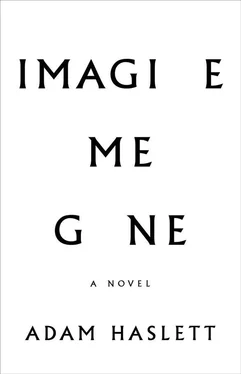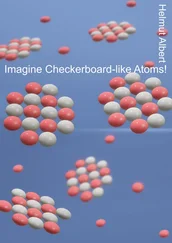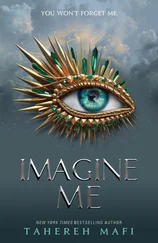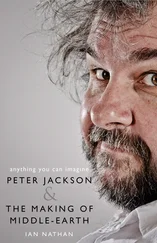“You can let go of that now, though,” I said. “The childish, obsessive stuff. That’s part of what you’ve been holding on to.”
“You’re not listening,” he said, and lifted the bottle again, filling his glass almost to the brim.
“Why don’t you take it easy,” I said, and reached over to slide the glass away from him, off to my right. “I’m here, I’m listening. Finish what you were saying.”
He stood slowly from the table, walked into the kitchen, and returned with another glass, which he filled and began to drink from. “I told you,” he said, in a voice I didn’t recognize, low and determined. “I have to sleep now.”
The countless times he’d said this before, I’d heard it as a complaint. To be sympathized with, yes, but not so much as to alter my plan. But this sounded different. There was no more pleading. Instead, he was doing what he never did — asserting himself. I could have stopped him. I could have taken the bottle away, and the second one he had carried in and placed on the floor beside his chair, and poured them both down the sink as I had the others. But I didn’t. I watched him drink that third glass of Scotch to the bottom, and another after it.
Did I know then what would happen — know without knowing?
At some point I stood up from that table and walked into the living room, where I scrolled through the music on Michael’s laptop, and found one of the albums I remembered him playing for me over and over. “Come here,” I called to him as Donna Summer’s “On the Radio” began to fill the air of the cabin.
Michael didn’t move at first and I called out to him again. Finally he raised himself and came in to perch unsteadily on the arm of the couch.
“Why are you playing this?” he asked.
What he had said to me a moment ago was true. I hadn’t been listening to him, not for years. I’d wanted him to be better for so long that I had stopped hearing him tell me he was sick. For the first time I saw him now as a man, not a member of a family. A separate person, who had been trying as hard as he could for most of his life simply to get by.
I took both his hands, interlacing our fingers, and I swayed to the beat, which had kicked in now beneath Summer’s pining voice. “Come on,” I said, encouraging Michael with the motion of my arms to sway with me, and after a moment he did, to my surprise, reluctantly rocking his head from side to side, woozy and out of time but responsive nonetheless, his knees bouncing just a little to the beat.
How long had we both been ashamed? How long had he suffered alone?
I stepped in closer and, taking his wrist in my hand, guided his arm around onto my waist, and put my own on his, holding him to me. Gently, I pressed his head down onto my shoulder. And then the two of us leaned against each other, and danced.
I remember seeing the taillights of the lobsterman’s pickup come on in the dark, and listening to the chug of its aging muffler as he backed onto the road and pulled away toward the harbor. That’s how I know it was still nighttime when, instead of remaining awake with him, I left Michael downstairs on his own.
I saw that other bottle of booze on the floor beside his chair. And I must have seen the bottles of Tylenol, too. He had placed them on the dining table, next to the salt and pepper. I saw, and yet I didn’t see.
I didn’t mean to wake you. You should go back to bed.
That’s what he had said to me when I came down. I knew he wasn’t going to stop drinking. Not until he slept, no matter what it took, or how long. But still I left him there on his own and went back up to my room and turned out the light.
I slept until midmorning, later than I ever usually did, a thick, dreamless sleep. I woke calmly to the sound of dripping and saw icicles outside my window melting in the sun. Lying there in the bed awhile, I listened for the sound of Michael in the house but heard nothing other than the trickling noises of the thaw out in the yard.
I got dressed and was halfway down the stairs when I saw him. He lay on the couch, eyes closed, head tilted back, his legs stretched toward me. Below the edge of the blanket covering his legs, his splayed feet were visible. A dried streak of vomit ran from the corner of his pale mouth, down his cheek and onto his shoulder. The empty bottles stood on the coffee table beside him.
I knew right away that he was dead. And that I had failed him.
Yet still I hurried to the couch and knelt beside him, as if I could shake his body back to life. His hands were cold to my touch, his chin jutting upward at an unnatural angle, as if he were gasping for breath. Lifting his head off the pillow, I gathered it into my arms, and clasped it against my chest, rocking back and forth, weeping into his hair. Wake up, I kept whispering, please, please wake up.
I have no memory of how long I held him. Or of how long afterward I remained in the chair opposite, beholding his body, the brow furrowed, the eyes resting like stones in their sockets. Long enough to observe a square of sun creep down the wall, across a map of the bay, and onto his glowing form, before it slid onto the rug and vanished.
I had never understood before the invisibility of a human. How what we take to be a person is in fact a spirit we can never see. Not until I sat in that room, with the dead vehicle that had carried my brother through his life, and for which I had always mistaken him.
I knew that as soon as I stood up, I would have to act. I would have to go into the world and seek help. But as long as I remained in the chair, in the silence, none of that could begin.
I didn’t believe it. You never do, at first. The force of the need for it not to be true blots the truth out. Afterwards, there is a daze.
I remember, once Alec had reached me and I had left work, lying on the floor in our living room, with the green fronds of the palm tree out on the sidewalk swaying against the white of the clouds through the top pane of the window and the telephone wires sagging gently across the view, and not thinking of Michael, not yet.
Strangely, what played itself over and over in my mind wasn’t Alec and Michael in the cabin and what could have happened between them, but a night almost two decades ago, back in Walcott. I had been out drinking with Jason and his friends in the field at the end of the brook path, sitting in the dark out in the meadow. Jason and I were still dating, despite my mother’s worry that we did drugs together, and despite my having lied to my father, on the last day of his life, about breaking up with him. I had told my father that because I thought it would make things easier for him, to be able to tell my mother that he had succeeded, knowing I could hide the truth from them easily enough.
Jason had been awkward around me for weeks. He didn’t know what to say about my father’s death. That night he kept slipping his hand out of mine. He joked restlessly with his friends and the girls they had brought with them, even as they paired off and began making out on the grass. When the banter died down, I nudged him onto his feet and we walked up the slope toward the woods, where we lay down and began kissing. I wanted to feel his weight on top of me, but he stayed up on his elbows, letting only our lips touch. The hours with him that summer were the only hours in which I didn’t feel drowned. I couldn’t tell him that, though. He wouldn’t have wanted to hear it.
I willed him to put his hand on my stomach, to nuzzle his face against my chest, taking us farther away. Instead, when he heard the voices of the others starting up again, he rose and sauntered back down the hill. I didn’t follow right away. I lay there taking in the stars in the clear night sky, listening to the voices trail off, telling myself that what my father had done wasn’t easy for Jason either. I needed to be patient.
Читать дальше












